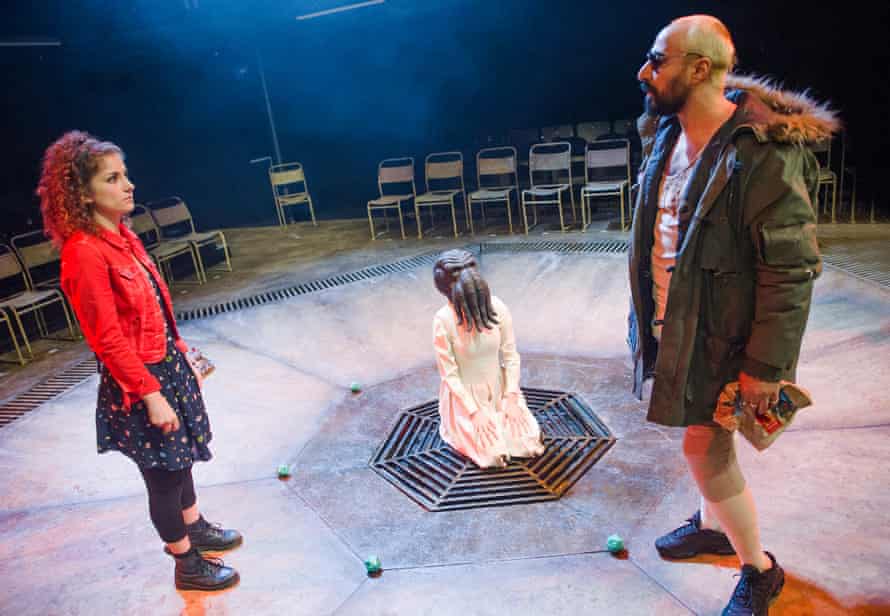TOListir McDowall’s new work, The Glow, takes audiences back to the 1860s, when Mrs. Lyall, a spirit medium, visits a madhouse in search of someone to act as an assistant. There he meets a strange, nameless, voiceless woman and brings her home, only to discover that the woman herself has powers.
The premise isn’t entirely unheard of, but McDowall cares as much about English myth and Arthurian legend as it is about the supernatural: how the past remains with us in the present, and how we fictionalize history to make sense of ourselves. McDowall set out to write a fairy tale “that would have real consequences,” taking something that seems to reside in the realm of the fantastic and basing it on the real world “for there to be an emotional cost and weight.”
The Glow is meant to catch people off guard, explains Zoom from Manchester, where he sits surrounded by boxes, having moved house the day before. Presenting audiences with something that looks familiar and then figuring it out is something McDowall is good at – his works have a way of playing up their expectations. This can make it difficult to write about them without revealing too much. X from 2016 is a good example: It is set in a research base on Pluto that has lost contact with Earth. The clocks begin to turn back. There is a glitch in time. But it is, at heart, a work about loss.

Time has played a key role in much of McDowall’s work. “Not considering time as an element of its own within the writing of the play,” he says, “would be like not considering the structure of the characters or the scene.” However, like JB Priestley, he has several jobs that could be described as “time games” and Brilliant Adventures from 2011 even contains a real time machine.
Most recently, Kate O’Flynn performed All of It, a 45-minute rattle through a woman’s life, at London’s Royal Court last year. It was directed, like X and The Glow, by Vicky Featherstone. “I tend to write works that have a pretty high concept,” he says. “There is always the danger that someone will become obsessed with the concept and do something flashy.” But Featherstone, he says, is deeply rooted. Despite X’s out-of-world location, he understood that “the story was pretty simple.”
Growing up in Great Broughton, North Yorkshire, McDowall’s interest in theater was sparked, in part, by a drama teacher. At school, he read a lot and started stealing books “which I have since returned through fault.” He finds the decline of theater in schools annoying, not only because it means potential writers or actors won’t have their eyes wide open like his, but also because theater can “temporarily erode all the divisions that can build up in school.” ”.
For starters, interested in cinema, he couldn’t afford a camera, but found that he could pressure his friends to participate in his works, many of which were “variations of The Breakfast Club.” By this he means a lot of people sitting in a room, talking. “That’s what I thought was a play.” But then he got into Beckett and Sarah Kane, Laurie Anderson and Sam Shepard, and he began to discover the potential of the theater. “I’m a theater nerd,” he laughs.

Originally commissioned by the Royal Welsh College of Music and Drama, before performing at London’s Orange Tree Theater, his 2014 play Pomona, a mix of dystopian suspense and Lovecraftian horror, feels like the antithesis of a Breakfast Club play. After a shaky first breakthrough, you recall thinking, “Oh God, I wrote a real stinker.” It’s a grim, nightmarish play in some places, but it became a cult hit and was transferred to the temporary space Shed at the National Theater. It is his most performed work to date and has been performed around the world, something that still seems to surprise him.
Reading an early draft of The Glow brings to mind everything from Caryl Churchill’s The Skriker to Stanley Kubrick’s The Shining. Critics often comment on McDowall’s deft way of using genre tropes, but he’s surprised the theater doesn’t do it more often. After all, he says, “a research base on Pluto is as bogus as a salon in Victorian London.”
McDowall is excited about the idea of people getting together in an auditorium one more time. For this reason, he says, the theater will always be his home: there is a magic there that cannot be found anywhere else. “You can put people in a room with some actors and you can go anywhere.”
www.theguardian.com
George is Digismak’s reported cum editor with 13 years of experience in Journalism